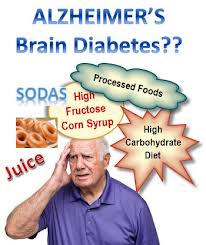 We have heard forever that carbohydrates are a major source of added (and unwanted) body fat, but dementia? So, when I came across this research, I thought to myself that well, there always is a New Year’s resolution about dropping weight by decreasing sweets and grains, but if a person also can reduce the long term risk of dementia, why not get on board?
We have heard forever that carbohydrates are a major source of added (and unwanted) body fat, but dementia? So, when I came across this research, I thought to myself that well, there always is a New Year’s resolution about dropping weight by decreasing sweets and grains, but if a person also can reduce the long term risk of dementia, why not get on board?
Well, it turns out that a doctor named Perlmutter has been documenting a wide range of medical literature that shows a link between blood glucose levels and risk for dementia. It seems that as early as 2005, researchers were finding a link between blood glucose levels and brain atrophy and cognitive decline. I won’t get into all the technicalities, but it seems to follow a path back to increased body inflammation and free radicals and “oxidative stress.” Okay, I said I would not get into technicalities. But you see a lot of the familiar language on real problems on the loose in one’s bloodstream.
And this is not in the radical fringe of medical journals. As recently as last summer, researchers reporting in the New England Journal of Medicine showed that continuous elevated blood sugar levels as measured by HbA1C were associated with higher risks for dementia. Reading between the lines, diabetics whose long term sugar levels are not in good control are not just at risk for diabetic retinopathy and other vascular compromise, but their brain function also may suffer.
All of that said, researchers do not show a direct causal relationship between elevated blood sugar levels and dementia. So, let’s retrace some of the steps. Increased carb consumption does lead to elevated blood glucose levels. People with elevated blood sugar levels also have been shown to have elevated heart event risk as well as immune issues. And we encourage people to lower their carb intake to improve heart health and immune system health. The author of the most recent research also points out that there are no experimental trials that show using seat belts reduces casualties, yet we accept that we ought to buckle up.
So, at the end of the day, you need to draw your own conclusions. And maybe unlike the seat belt analogy, we can say that we all should practice moderation in our carbohydrate consumption. And that is not something you would see driving safety advocates offering. “Use seat belts in moderation?” So here are some medical citations for those who want to see the research. For your brain’s sake, read what you will and draw your own conclusions:
- Enzinger C, Fazekas F, Matthews PM, et al. Risk factors for progression of brain atrophy in aging. Neurology. 2005;64:1704-1711.
- Crane PK, Walker R, Hubbard RA, et al. Glucose levels and risk of dementia. N Engl J Med. 2013;369:540-548.
- Erickson KI, Voss MW, Prakash RS, et al. Exercise training increases size of hippocampus and improves memory. Proc Natl Acad Sci U S A. 2011;108:3017-3022.
Charlotte Bishop is a Geriatric Care Manager and founder of Creative Care Management, certified professionals who are geriatric advocates, resources, counselors and friends to older adults and their families in metropolitan Chicago. Please email your questions to info@creativecaremanagement.com.





